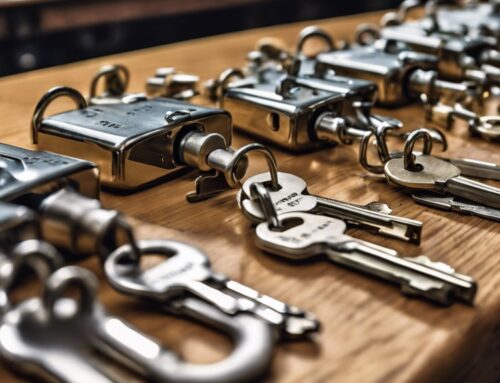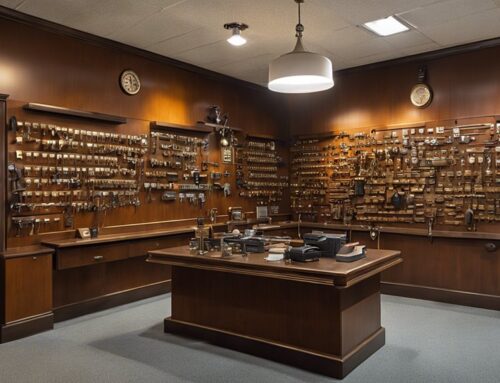You could get arrested just for owning a lock pick, but the truth is a bit more nuanced. In Illinois, the legal framework around lock picking isn't just a jumble of rules—it's a critical balance between personal rights and property protection. Understanding the boundaries can save you from unexpected legal troubles, especially when it comes to using these tools responsibly. So, what should you know to navigate this landscape effectively and guarantee you're staying on the right side of the law?
Key Takeaways
- Possession of lock picking tools is legal in Illinois if there is no unlawful intent and for legitimate purposes, like locksmithing.
- Explicit permission from the property owner is essential for lock picking on someone else's property, while personal property can be accessed without consent.
- Using lock picking tools with intent to commit a felony can lead to severe penalties, including felony charges and imprisonment.
- Ethical guidelines stress responsible use, non-destructive techniques, and respect for property rights to maintain community trust.
- Staying updated on legal regulations through workshops, legal texts, and consulting professionals is vital for lawful lock picking practices.
Legal Status of Lock Picking Tools
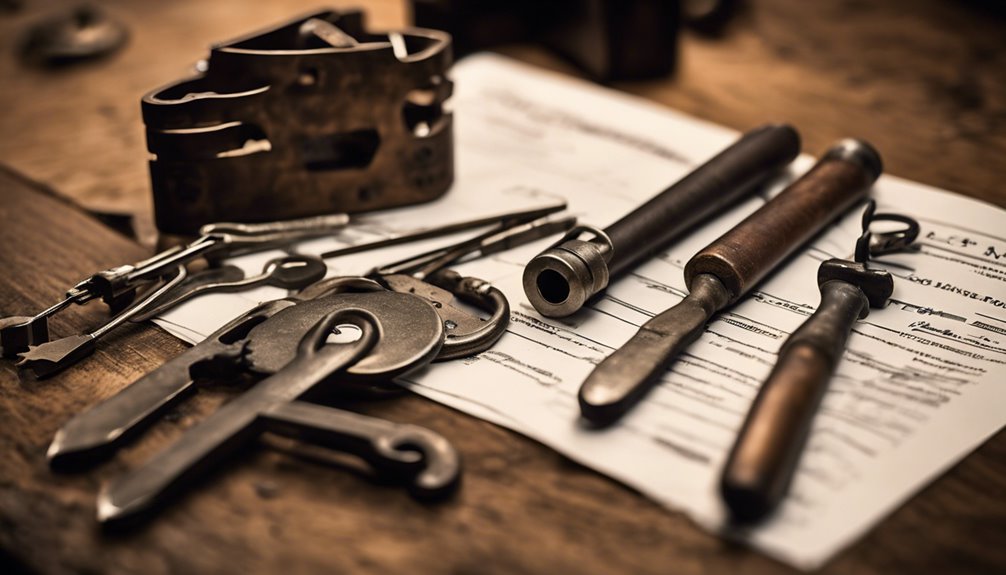
While you might think about the legality of lock picking tools in Illinois, it's important to understand that possessing these tools is generally legal if there's no intention to use them unlawfully. The law distinguishes between lawful possession and criminal intent, emphasizing that having lock picking tools isn't inherently illegal. If you own these tools for legitimate purposes, such as locksmithing or hobbyist activities, you're within your rights. Additionally, locks in rental properties should not be tampered with unless consistent with lock change laws, which outline the proper procedures for any modifications. Landlords are typically responsible for maintaining the security of their properties, including the rekeying process, which can affect how locks are managed.
However, intent plays a significant role. You mustn't plan to use these tools for felonies or theft. Engaging with locks that don't belong to you without permission lands you in legal trouble, as unauthorized use is a criminal offense. If you're caught using them without explicit consent, you could face serious repercussions, including fines and potential jail time.
Moreover, it's important to remember that locksmiths and law enforcement personnel can use these tools as part of their professional duties, operating under different legal allowances. It's imperative to restrict your activities to locks you own or for which you have clear authorization to manipulate.
Failure to adhere to these regulations could result in charges that may escalate to a Class 4 felony if you possess the tools with malicious intent. Ultimately, knowledge of these laws is essential, as many states enforce lock picking laws through penalties and monitoring. By staying informed and acting responsibly, you can rightfully embrace your freedom while managing the legal landscape surrounding lock picking tools in Illinois.
Definition of Burglary Tools
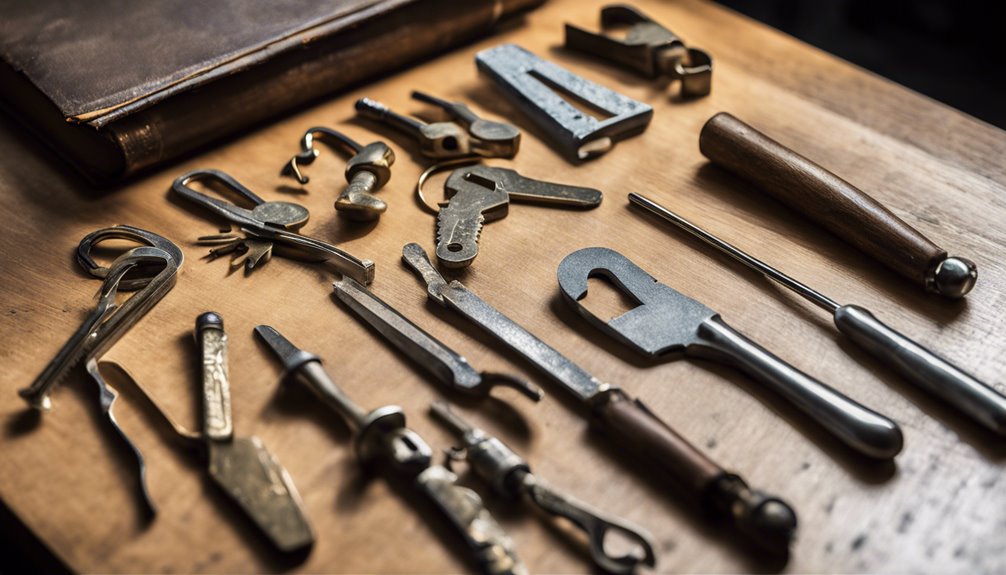
Burglary tools are defined as any items that can be utilized for breaking into a building or vehicle, encompassing a wide range of instruments. This definition includes keys, lockpicking kits, screwdrivers, hammers, crowbars, and even everyday tools that, when used with intent to commit a crime, become classified as burglary tools.
Illinois law specifies that items like tubular lock picks and bump keys fall within this category, highlighting the broad spectrum of devices that may assist in unlawful entry. Additionally, using such tools for unauthorized locksmithing can result in serious legal consequences, emphasizing the importance of compliance with state laws. According to Illinois regulations, locksmithing ethics and licensing are critical to mitigating misuse of these tools.
To meet the legal threshold of being classified as burglary tools, possession of these items must be accompanied by criminal intent. This means you can technically own various tools without facing legal repercussions, provided they aren't meant for unlawful purposes. In fact, many states maintain a list of specific items categorized as burglary tools, which adds to the complexity of determining legality.
However, if you possess tools with the intent to break into a structure, such as a building, vehicle, or trailer, you risk being charged with a crime. The distinction hinges on your intent at the time of possession.
Circumstances surrounding possession play a significant role. Law enforcement and courts will often evaluate the context—were the tools found in an unusual setting or accompanied by other incriminating evidence?
Fundamentally, while the basic definition of burglary tools encompasses a wide array of objects, the legality of possessing them pivots on your intent and the circumstances under which they're held. As such, understanding these nuances is essential to navigate your rights effectively.
Penalties for Misuse
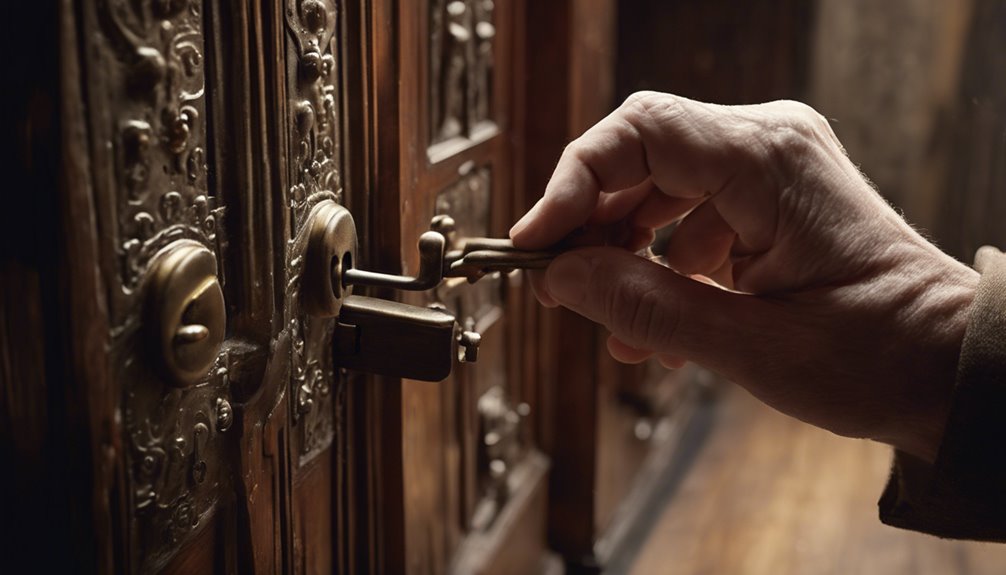
Misuse of lock picking tools carries significant legal ramifications in Illinois. If you're found possessing lock picking tools with the intent to commit a felony or theft, you may face a Class 4 felony charge. A conviction can result in imprisonment for up to three years or hefty fines reaching $25,000. Although some offenders might receive probation instead of imprisonment, a criminal record will follow, potentially impacting your future opportunities. It's important to recognize that key duplication services can operate under legal frameworks that may differ from lock picking laws. Additionally, the involvement of locksmiths in eviction processes in Illinois highlights the necessity of adhering to legal protocols when using tools related to locks.
Using lock picking tools without authorization can also lead to serious consequences. Depending on the specifics, you could face either misdemeanor or felony charges. Misdemeanor charges may come with fines and jail time of up to six months, while more serious offenses can escalate to felonies, triggering longer prison sentences. Additionally, any property damage caused during unauthorized use could incur further penalties. It is important to note that possession of lock picking tools with criminal intent is specifically illegal in most states.
The unlawful sale or transfer of lock picking tools is treated similarly as a Class 4 felony. You must be aware that these tools are intended for illegal entry. Failure to maintain proper transaction records can downgrade your offense to a misdemeanor, demonstrating the legal requirements for maintaining transparency in such transactions.
Ultimately, a conviction for any misuse of lock picking tools not only tarnishes your personal reputation but may lead to broader social and community repercussions. Future court appearances and legal fees can also add to your burden, making it imperative to understand these penalties and navigate this legal landscape cautiously.
Permitted Use Cases

Understanding the legal landscape surrounding lock picking tools in Illinois is important, especially since lawful possession and use of these tools can be entirely legitimate under certain circumstances.
In Illinois, you can legally possess, sell, and utilize lock picking tools as long as you have no intention of engaging in unlawful activities. This flexibility means that if you're a locksmith or a hobbyist practicing safe techniques, your actions are considered permissible. Additionally, it's crucial for individuals to familiarize themselves with employment laws to ensure they operate within the legal framework of their profession.
However, using these tools on someone else's property requires explicit permission from the property owner. This authorization is essential to avoid potential charges of trespassing or breaking and entering.
When dealing with your own property—like your home or vehicle—you can employ lock picking without seeking additional consent. Professional locksmiths must also obtain permission from clients to legally perform their services.
Several specific scenarios fall under permissible use cases. For instance, if you forget the key to your lock, you're legally allowed to pick it. Additionally, practicing your lock picking skills on your own locks is encouraged within the legal framework.
Educational or training purposes also qualify as valid uses, provided you have proper authorization. Furthermore, locksmiths must adhere to essential lock safety standards to ensure their practices remain within legal boundaries.
It's important to understand that all lock picking activities must comply with state laws and ethical guidelines. Maintaining a responsible approach, including a solid awareness of local regulations, will guarantee that you navigate the hobby effectively and avoid unintended legal complications.
Specific Statutes and Regulations

While possessing lock picking tools is legal in Illinois under certain conditions, it's vital to navigate the specific statutes governing their use. Understanding these rules not only protects your freedom to utilize such tools appropriately but also safeguards you from legal pitfalls. Below are key considerations to keep in mind:
- Intended Use: Possession of lock picking tools is illegal if you intend to use them for unlawful purposes, such as breaking into secure spaces like buildings or vehicles. Additionally, locksmiths must adhere to local licensing regulations when utilizing such tools in their trade.
- Owner Permission: You must obtain explicit permission from the property owner to legally possess and use lock picking tools on their property.
- Licensing for Locksmiths: If you're a locksmith, make certain you comply with state licensing requirements. Proper certification distinguishes lawful locksmith activities from unlawful practices.
- Sale Regulations: The sale or transfer of burglary tools designed for breaking into property is illegal. This includes any tools specifically altered for such purposes and subjects you to penalties.
Additionally, locksmith services must also consider ensuring ADA compliance to provide accessibility for all clients.
The severity of penalties for violating these statutes can range from fines to imprisonment, depending on the specifics of your situation.
As a result, it's important to remain vigilant and guarantee you fully understand the legal boundaries surrounding lock picking in Illinois. This knowledge empowers you to engage in lawful activities while avoiding unintended legal consequences.
Intent and Legal Implications

Understanding criminal intent is essential when it comes to lock picking laws in Illinois.
If you possess lock picking tools, make certain your purpose aligns with legal guidelines to avoid severe penalties.
Misuse or misinterpretation of these laws can lead to significant legal consequences, including fines and imprisonment.
Defining Criminal Intent
Criminal intent plays a pivotal role in the legal framework surrounding lock picking in Illinois, as it directly influences the severity of charges and potential penalties one might face. Understanding the nuances of intent can delineate between lawful possession and illegal usage of lock picking tools.
- Specific Intent Crimes: Requires proof of intent to commit a specific crime, such as theft or burglary.
- General Intent Crimes: Focuses on the intentional performance of the act, without needing to demonstrate intent for a particular crime.
- Possession Implications: Having lock picking tools with the intent for unlawful use is a criminal offense.
- Legal Consequences: Violating intent-based laws can lead to misdemeanors or felonies, fines up to $1,000, and potential imprisonment.
In Illinois, intent is essential for convictions. If you possess the tools for legitimate reasons, such as locksmithing, you may defend against charges.
Ultimately, the context and circumstances surrounding the possession can greatly affect whether the act is viewed as criminal. Understanding this distinction is important to maneuvering the legal landscape surrounding lock picking.
Legal Possession Guidelines
Possessing lock picking tools in Illinois is permissible when you intend to use them lawfully, such as for locksmithing or amateur practice with consent. To guarantee compliance with state regulations, it's crucial to understand the intent behind your possession. If you own these tools for legitimate reasons, like securing property or enhancing your lock-picking skills ethically, your actions remain within legal boundaries.
However, using lock picking tools without explicit permission from the property owner constitutes illegal activity. Licensed locksmiths and law enforcement personnel are authorized to possess and utilize such tools as a part of their profession. Hobbyists, too, can practice on locks they own or have received consent to manipulate.
It is important to recognize that possession for unlawful purposes is a criminal offense. If you're found in possession of these tools while committing a crime, you may face additional charges.
Always verify your intent aligns with the law, as possession that appears suspicious can raise legal concerns, regardless of use. By adhering closely to state statutes regarding lock picking, you can navigate the legal landscape responsibly and maintain your freedom.
Penalties for Misuse
While the legal possession of lock picking tools can be acceptable under certain conditions, misusing them can carry severe penalties in Illinois. If you're found in violation of the law, you'll face significant legal consequences that can hinder your freedom.
- Unauthorized Possession: Possessing lock picks without lawful reason is a Class 4 felony, punishable by up to 3 years in prison and fines reaching $25,000.
- Intent to Commit Crime: If you possess these tools with the intention to commit burglary or theft, expect harsher penalties, potentially elevating the charges to a felony.
- Unauthorized Use: Gaining unauthorized access using lock picks is a criminal offense, punishable by imprisonment and fines, alongside possible restitution to victims.
- Sale of Burglary Tools: Selling lock picking tools while knowing they're intended for unlawful use is also a Class 4 felony, carrying similar ramifications.
Understanding these penalties is essential for anyone considering possession. The serious legal implications associated with misuse can't only restrict personal freedom but can also have long-lasting impacts on your future, including employment options and personal reputation.
Educational Resources Available

To enhance your understanding of lock picking, consider enrolling in online courses that offer structured learning.
You may also explore community workshops and classes, which provide hands-on experience and direct instruction.
These resources can greatly aid in developing your skills while ensuring compliance with Illinois laws.
Online Lock Picking Courses
Many aspiring locksmiths and hobbyists find online lock picking courses to be invaluable resources for mastering the art of lock manipulation.
These courses empower you by providing extensive training that's flexible and accessible, featuring a variety of essential topics.
Key components often include:
- Methodologies: Learn techniques for manipulating different pin types, including mushroom, spool, and spiral pins.
- Tools & Practices: Gain insights into bump keys, specialized tools, and practical skills such as single pin picking and raking.
- Diverse Locks: Master the handling of various locks, from high-security models to tubular locks and deadbolts.
- Legal Context: Understand the laws surrounding lock picking, emphasizing ethical considerations and the importance of obtaining explicit permission before attempting to pick a lock.
Instructors, often seasoned professionals with decades of experience, offer you invaluable insights and practical skills that can enhance your expertise.
By traversing these online resources, you align with a framework that respects both personal freedom and lawful practices.
Consequently, you can pursue your passion while remaining conscientious of legal boundaries in Illinois.
Community Workshops and Classes
Building on the knowledge gained from online lock picking courses, community workshops and classes offer an interactive platform for hands-on learning that complements theoretical education.
Local locksmiths typically conduct these workshops, providing practical guidance that enhances your skills in lock picking and bypassing techniques. By searching local directories or online resources, you can locate workshops that focus on the essential practices of locksmithing.
These sessions often prepare you for locksmith licensing examinations, which consist of 305 multiple-choice and true/false questions. Taking part in these classes enables you to grasp complex concepts through direct application, making you well-equipped for various locksmith scenarios.
It's advisable to register ahead of time, directly contacting the workshop organizer to secure your place.
While formal training isn't strictly required for licensure in Illinois, participation in these programs greatly boosts your competency. You could also consider apprenticeships under experienced locksmiths as an alternative pathway.
Regardless of your choice, community workshops and classes provide invaluable practical knowledge and resources for those keen to expand their locksmithing skills while staying informed of the legal boundaries surrounding lock picking.
Common Misconceptions

While some may assume that lock picking is primarily synonymous with criminal activity, this view overlooks its legitimate applications and the realities of the practice. Misconceptions about lock picking in Illinois can cloud your understanding of its purpose and functionality. Clarifying these points will help you appreciate the diverse domains where lock picking is relevant:
- Not Just Criminal: Most lock picking isn't used for burglary; criminals favor more destructive methods. Legitimate endeavors include locksmithing, survival skills, and hobbyist activities.
- Time and Skill Required: Contrary to popular belief, mastering lock picking isn't instantaneous. Gaining access to even simple locks can take 10 to 15 seconds, while more intricate ones demand patience and practice, often totaling several minutes.
- Variety of Tools: Standard lock picks don't open every lock. Different locks necessitate specific tools; for example, warded picks and tubular picks cater to diverse mechanisms, illustrating that no single tool achieves universal access.
- Legality of Tools: In Illinois, possessing lock picking tools isn't illegal unless there's intent for unlawful use. You can own these tools for valid reasons like locksmithing, provided you have permission to engage in lock picking on the property.
Understanding these misconceptions about lock picking empowers you to appreciate its legitimate uses and equips you with informed perspectives on the actual laws governing this fascinating skill.
Ethical Considerations

When engaging in lock picking, you must adhere to responsible use guidelines that prioritize ethical conduct and community trust.
Your actions not only reflect on your integrity but also impact public perceptions of lock picking as a skill.
Maintaining transparency and obtaining proper authorization guarantees that you contribute positively to community relations while protecting property rights.
Responsible Use Guidelines
Understanding the ethical implications of lock picking is essential for anyone interested in this skill, as engaging in responsible practices assures compliance with legal standards and respects the rights of property owners.
To guarantee your lock picking activities remain ethical, consider the following guidelines:
- Legal Compliance: Always possess lock picking tools with the intent to use them lawfully. Unauthorized use can lead to serious legal consequences.
- Obtain Permission: Always get explicit permission from the property owner before attempting to pick any lock. Respecting ownership is paramount.
- Non-Destructive Techniques: Use proper tools and methods to avoid damaging locks. Aim for non-destructive entry to preserve the integrity of the property.
- Ethical Use: Commit to utilizing your skills only for ethical purposes, prioritizing respect for property rights and the privacy of others.
Impact on Community Trust
Engaging in responsible lock picking not only upholds ethical standards but also greatly impacts community trust. When you practice lock picking transparently and with explicit permission from property owners, you foster a sense of security and respect. Unauthorized activities can quickly lead to suspicion and mistrust, crippling the reputation of your hobby. By aligning your actions with ethical considerations, you enhance the community's perception of lock picking.
Respecting property rights and privacy is fundamental. When you obtain consent before picking a lock, you reinforce trust and demonstrate professionalism. Continuous education about the legal and ethical implications of your activities is essential; it empowers you to make informed decisions that resonate with community values.
Furthermore, your role as an ethical lock picker contributes to the broader dialogue on security. By identifying weaknesses in locks, you not only bolster individual security but also foster collaboration with locksmiths and property owners.
Ultimately, your responsible practices in lock picking lead to a strengthened community, where trust and cooperation pave the way for improved security measures and a positive image for all hobbyists.
Staying Informed on Changes
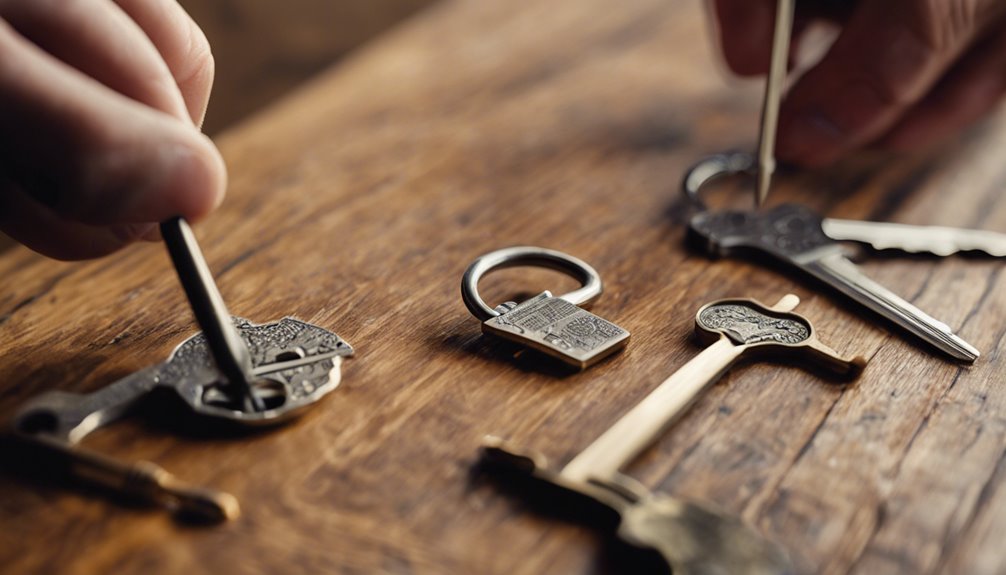
To effectively navigate the intricate landscape of lock picking laws in Illinois, staying informed about any changes in legislation is essential. The legal framework surrounding lock picking is dynamic, and failing to keep up with updates can lead to significant consequences.
As a responsible individual, consider the following strategies to help you stay informed:
- Regularly Review Legal Texts: Familiarize yourself with relevant statutes and regulations, as these documents provide the foundational knowledge required for compliance. Bookmark state resources to streamline your access.
- Follow Legal News Sources: Subscribe to legal journals or online platforms that cover developments in Illinois law. Such sources can help you track changes in lock picking statutes and related legislative activities.
- Attend Workshops and Seminars: Participate in events focused on locksmithing or legal issues related to lock picking. These gatherings offer a chance to engage with experts and learn about recent legal adjustments.
- Consult with Professionals: Establish relationships with licensed locksmiths or legal advisors. These professionals can offer timely insights and clarifications regarding specific statutes and how they may impact your practices.
Frequently Asked Questions
Can I Use Lock Picking Tools for Fun at Home?
You can use lock picking tools for fun at home, provided you're doing so legally and ethically.
Make certain you own the locks you're practicing on, or have explicit permission from the owner.
Enjoying this hobby responsibly requires understanding your local laws and staying informed.
If you're uncertain about any regulations, consider connecting with local lock picking communities for guidance and to guarantee you're practicing within the legal boundaries.
Are There Age Restrictions for Owning Lock Picking Tools?
When you think of a young Sherlock Holmes, solving mysteries with clever tools, you might wonder about age restrictions on owning lock picking tools.
In Illinois, there aren't any specific age limitations; anyone can possess them as long as their intent remains lawful.
However, whether you're a minor or adult, you must have permission to use these tools on locks, or you risk facing serious legal consequences.
Stay lawful and wise!
How Can I Become a Certified Locksmith in Illinois?
To become a certified locksmith in Illinois, you need to be at least 18 and demonstrate good moral character.
Start by applying through the Illinois Department of Financial and Professional Regulation. You'll take a licensing exam, featuring 305 questions, so prepare well.
Submit fingerprints for a background check, pay the fees, and register your business if applicable.
Don't forget to maintain records and comply with continuing education requirements to keep your license active.
What Are the Best Practices for Ethical Lock Picking?
To practice ethical lock picking, you should always obtain explicit permission from the property owner before attempting any lock.
Use proper, high-quality tools and apply non-destructive techniques to maintain lock integrity.
Respect privacy and property rights, ensuring your actions are lawful and responsible.
Keep your skills confidential to prevent misuse.
Prioritize safety by wearing protective gear, and never pick locks that are in use or lack consent from the owner.
Is There a Difference Between Lock Picking and Lock Bumping?
"There's more than one way to skin a cat." In the domain of lock manipulation, lock picking and lock bumping differ considerably.
Lock picking requires skill and precision, as you interact directly with each pin to set them at the shear line.
Conversely, lock bumping utilizes a specially cut key to transfer kinetic energy, often quicker but less versatile.
Your choice between techniques hinges on the situation and the lock's compatibility, emphasizing decisiveness.
Conclusion
In conclusion, understanding the legal boundaries of lock picking in Illinois is essential to avoid potential pitfalls. Are you aware of the implications that even possessing lock picking tools can carry if misused? By adhering to the state's regulations and ensuring you're acting within the law, you can navigate this complex landscape responsibly. Stay informed about any changes to the legal framework to protect yourself and others, ensuring your lock-picking practices are both safe and lawful.




